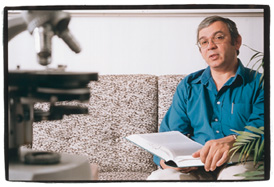Are you a journalist? Please sign up here for our press releases
Subscribe to our monthly newsletter:

When you grow up in a place where books are scarce and teaching resources nearly nonexistent, a higher education seems unattainable.
"Since I can remember, I've always wanted to be a scientist. But when I was a child, I didn't know how that was going to be possible," says Prof. Yosef Shaul of the Weizmann Institute's Molecular Genetics Department. Shaul was born in 1949 in a small Jewish community within a Muslim town in Iran. His father was an educated trader who, despite the lack of resources, worked hard to ensure that all his children received both a quality education and a special thirst for knowledge.
At the age of 13, Shaul emigrated to Israel together with his older brother because his father was concerned that the boys' education would be compromised if they did not begin high school in Israel as soon as possible. The brothers came to Israel as part of the Youth Aliyah program, which placed them in the Ben-Shemen agricultural boarding school. Not knowing the language, they had to manage in school as best they could.
Because of these transition problems, Shaul's grades at the boarding school were less than perfect. He was therefore quite surprised when he was chosen to represent Ben-Shemen at a Weizmann Institute annual science day. "I don't know why of all the students they selected me ? it couldn't have been my grades," he recalls. "I remember the lectures we heard at the Weizmann Institute, and the different laboratories we visited, watching science in action. That visit left a profound impression on me."
Since he had been educated at an agricultural school, Shaul decided to apply to the Hebrew University's Agricultural Faculty in Rehovot, just across the street from the Weizmann Institute. After his first academic year, his grades were high enough to provide him with scholarships that covered the rest of his tuition. In 1974 he received his bachelor's degree in agriculture, and three years later a master's degree in animal physiology.
Over the years, Shaul would often go to hear the lectures and seminars offered every Friday in the Weizmann Institute's Wolfson Auditorium. So when he decided to pursue a doctoral degree in gene expression, it was quite natural that he should choose to "cross the street" to the Institute. He went on to complete his doctoral degree in 1981, and then moved to San Francisco for his postdoctoral work.
Although during his doctoral studies Shaul had focused on gene expression, he later moved quite intensively into the field of virology. "As a doctoral student, I found myself increasingly exposed to the topic of virology, and when I went to do my postdoctoral work at the University of California, San Francisco, the viruses 'followed' me. I became involved in the world of hepatitis B and saw how deadly the disease could be. At that point I decided to combine gene expression and virology," he explains.
"Cells and viruses are enemies, but the virus alone is a conqueror. At the molecular level, what interests me is the relationship between the virus and the cell, and what happens once the virus has taken over the host."
Shaul has discovered the mechanism by which the hepatitis B virus successfully expresses its gene in liver cells. He has also found that the virus has a special protein that distorts the normal process of gene expression in cells. The distortion leads to the manufacture of viral proteins by the cell. One of his prized possessions is a tiny glass bottle, which he keeps on a shelf above his desk. Inside is the formula of the vaccine he helped to develop, which will eventually protect millions of people from hepatitis B.